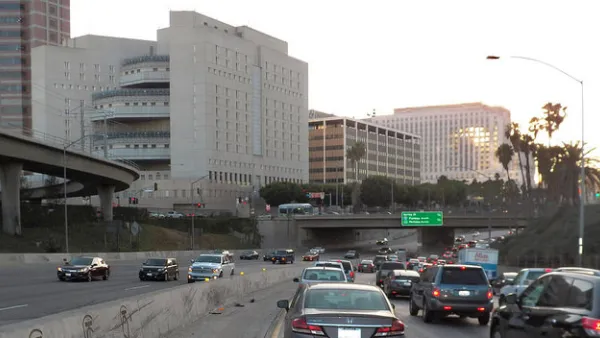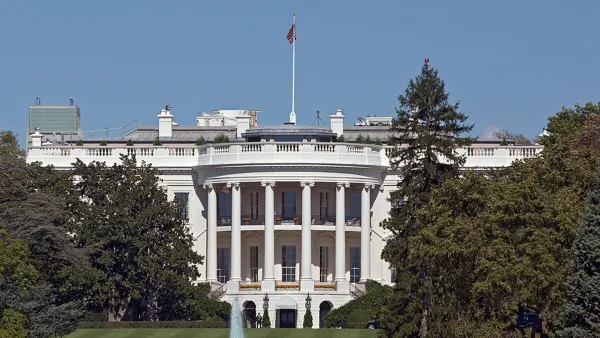Conventional thinking is that the auto industry, wanting to sell more fuel-gulping SUVs, are pushing for weaker fuel economy standards, but Hiroko Tabuchi, climate reporter for The New York Times, exposes Big Oil's stealth campaign.

"In Congress, on Facebook and in statehouses nationwide, Marathon Petroleum, the country’s largest refiner, worked with powerful oil-industry groups and a conservative policy network financed by the billionaire industrialist Charles G. Koch to run a stealth campaign to roll back car emissions standards, a New York Times investigation has found," reports Hiroko Tabuchi.
The logic is simple: Lower standards means more gasoline sales. "The campaign’s main argument for significantly easing fuel efficiency standards is that the United States is so awash in oil it no longer needs to worry about energy conservation."
The campaign proved effective, as parts are reflected in the rule proposed by the Trump administration in August, the Safer Affordable Fuel Efficient (SAFE) Vehicles Proposed Rule for Model Years 2021-2026.
In recent months, Marathon Petroleum also teamed up with the American Legislative Exchange Council (ALEC), a secretive policy group financed by corporations as well as the Koch network, to draft legislation for states supporting the industry’s position.
Its "Resolution In Support Of The Reconsideration Of Corporate Average Fuel Economy (CAFE) Standards," points to the historical underpinning of the U.S Department of Transportation's fuel economy standards, "implemented largely in response to the 1973 oil embargo in an effort to reduce foreign imports of petroleum," takes aim at changes made under the Obama administration.
In 2010, the U.S. Environmental Protection Agency and the California Air Resources Board joined the National Highway Traffic Safety Administration (NHTSA, a division of USDOT) to regulate tailpipe emissions as well as fuel economy, a result of the 2007 U.S. Supreme Court's decision in Massachusetts v. EPA that affirmed that the Clean Air Act gives authority to EPA and California to regulate greenhouse gas emissions. The three agencies agree to a "One National Program," also called “Single National Standard.”
The energy industry’s efforts also help explain the Trump administration’s confrontational stance toward California, which, under federal law, has a unique authority to write its own clean-air rules and to mandate more zero-emissions vehicles.
Legislation was proposed last year by Rep. Roger Williams (R-Tex.) to abandon fuel economy standards altogether.
Why Marathon Petroleum?
[F]or gasoline producers like Marathon, a shift toward more efficient vehicles poses a grave threat to the bottom line. In October, the company acquired a rival, Andeavor [formerly Tesoro], making it the biggest refiner in the United States, with sales of 16 billion gallons of fuel a year.
Andeavor also surfaced in a recent Planetizen post showing the influence of Big Oil, but in an overt, not stealthy, manner. Andeavor, BP America, and Phillips 66 were identified as the largest contributors to the successful campaign to defeat a Washington carbon fee initiative, setting a Washington state fundraising record.
FULL STORY: The Oil Industry’s Covert Campaign to Rewrite American Car Emissions Rules

National Parks Layoffs Will Cause Communities to Lose Billions
Thousands of essential park workers were laid off this week, just before the busy spring break season.

Retro-silient?: America’s First “Eco-burb,” The Woodlands Turns 50
A master-planned community north of Houston offers lessons on green infrastructure and resilient design, but falls short of its founder’s lofty affordability and walkability goals.

Delivering for America Plan Will Downgrade Mail Service in at Least 49.5 Percent of Zip Codes
Republican and Democrat lawmakers criticize the plan for its disproportionate negative impact on rural communities.

Test News Post 1
This is a summary

Test News Headline 46
Test for the image on the front page.

Balancing Bombs and Butterflies: How the National Guard Protects a Rare Species
The National Guard at Fort Indiantown Gap uses GIS technology and land management strategies to balance military training with conservation efforts, ensuring the survival of the rare eastern regal fritillary butterfly.
Urban Design for Planners 1: Software Tools
This six-course series explores essential urban design concepts using open source software and equips planners with the tools they need to participate fully in the urban design process.
Planning for Universal Design
Learn the tools for implementing Universal Design in planning regulations.
EMC Planning Group, Inc.
Planetizen
Planetizen
Mpact (formerly Rail~Volution)
Great Falls Development Authority, Inc.
HUDs Office of Policy Development and Research
NYU Wagner Graduate School of Public Service





























